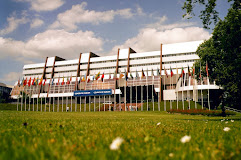On 10
March 2022, Russia
announced that it will no longer participate in the Council of Europe. In the
coming days we will learn more whether Russia will submit a formal declaration
of withdrawal pursuant to Article 7 of the Statute of the Council of Europe,
and whether it will provide any reasons for this decision.
In a short statement that was issued
today, the Russian Ministry of Foreign Affairs indicated that they will no longer participate in the Council of Europe in response to the EU's and NATO’s continued efforts to
destroy the Council of Europe and the common humanitarian and legal space in
Europe. I will refrain from engaging with the details of this "argument",
which is nothing but a continuation of Russia’s perversion of international law
and institutions. However, one way of understanding this statement is that Russia
may leave Europe's main organisation on human rights, rule of law and
democracy in response to its recent
suspension related to the war in Ukraine.
If Russia chooses to withdraw from the Council of Europe or the latter chooses to expel the former, such an outcome should be analysed in the context of Russia’s long history of unwillingness
to commit to peace in Europe.
Russia has
never been an easy member of the Council of Europe. This was not only because
it was the biggest
violator of the Convention but primarily because of its wars and
imperialistic foreign policy. A year before joining the Council of Europe,
Russia’s admission process was interrupted
because of the 1995 brutal conflict in Chechnya. In 1996, when Russia
joined the organisation, the CoE
rapporteur concluded that “Russia [did] not … meet all Council of Europe
standards” but that
“integration [was] better than isolation [and] cooperation [was] better than
confrontation”. The Council was right
to favour integration over isolation and to give Russia a chance. In many
ways, this helped, even if minimally, improve human rights in Russia.
Yet, again and again, Russia proved to be unwilling to
commit to peace. Despite the 1996 PACE’s
membership requirements that called for the withdrawal of Russian troops
from Transdniestria, Russia’s army remained in Transdniestria. Its aggression against
Georgia and Ukraine are a testament of its imperialistic foreign policy that contradicts the basic aims of the Council of Europe.
Although a problematic member of the organisation, Russia’s eventual withdrawal from the
Council of Europe would present a sad development for Russians and other citizens falling involuntarily (including in Ukraine, Georgia, Moldova…) under the jurisdiction
of Russia as it marks the end of the application of the ECHR in a State that is
in dire need of human rights. Yet, this sad reality, with or without withdrawal from Russia, can only change when a new
Russian Government is willing to genuinely commit to upholding both peace and
human rights. Let us hope this future is not too distant.

